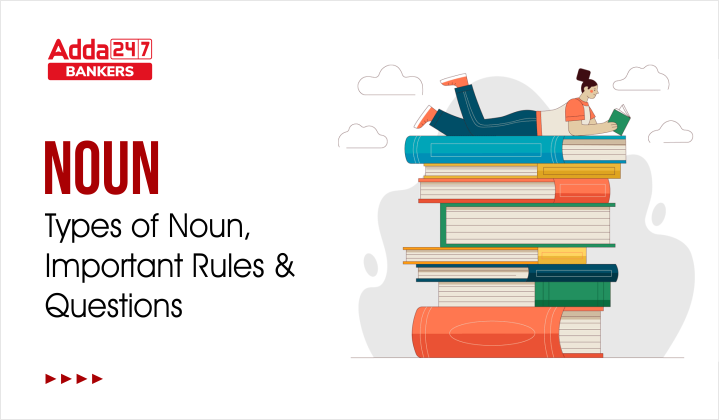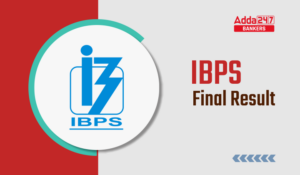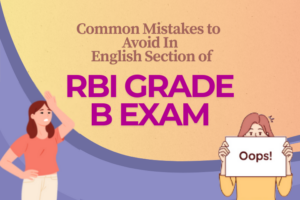Table of Contents
Types of Nouns: The English Language has much weightage in the Prelims and mains examination of Banking. Candidates can boost their overall score by fetching good marks in the English section. Nouns are the basics of English Grammar and the very first part of speech that we learn while studying the English Language. One can score well in the English section if you have a strong hand in English grammar basics. Considering the importance of grammar we have covered the topic Nouns in this article. Aspirants can go through the article to know the types of noun and their important rules.
What is a Noun?
A word that is used to name a person, animal, place, or a thing is called a Noun. Nouns are also called as the Naming Words. Noun is that part of speech which is definitely found in a sentence.
Types of Nouns
Nouns are broadly classified into various categories. The different types of nouns are:
- Common Nouns
- Proper Nouns
- Concrete Nouns
- Abstract Nouns
- Countable Nouns
- Uncountable Nouns
- Collective Nouns
- Compound Nouns
- Singular Nouns
- Plural Nouns
Common Nouns
Common nouns refer to people, places, and things in general like chairs or dogs.
Examples: teacher, car, music, danger, receipt, etc.
For Ex- Have you seen my Cat?
Proper Nouns
Proper Noun refers to the name of people, places, organizations or any specific thing. Your name is a proper noun. For ex- Delhi is a proper noun. We always start a proper noun with a capital letter.
Concrete Nouns
Concrete nouns refer to physical things that you can touch. For ex- Man, Rice, etc.
For Ex- She is fond of reading books.
Abstract Nouns
Abstract nouns refer to the opposite of concrete nouns. They are things that you cannot touch. Abstract nouns are ideas, concepts, and feelings of a person.
Examples: happiness, courage, danger, truth, etc.
For Ex- Honesty is the best policy.
Countable Nouns
Countable nouns are those nouns that you can count. Countable nouns have singular and plural forms.
Examples: ball, boy, cat, person, etc.
For Ex- Ravi bought a dozen eggs from the market.
Uncountable Nouns
Uncountable nouns refer to the nouns that you cannot count. For ex- Water, sadness, etc.
For Ex- Give me a glass of water.
Collective Nouns
A collective noun refers to a group of individuals, animals or things.
For Ex- Her family lives in different countries.
Compound Nouns
A compound noun refers to a noun that is made with two or more words. Most compound nouns are [noun + noun] or [adjective + noun]. For ex- cat food, blackboard, breakfast, full moon, etc.
Singular Nouns
Nouns that are used to name a single person, place, animal or object are known as Singular Nouns.
For Ex- A little girl is living alone in that house.
Plural Nouns
When a number of people, places, animals, and objects are referred then we use Plural Nouns.
For Ex- Some apples are kept in the refrigerator.
Important Rules of Noun
1. Some Nouns always take a singular verb.
For ex-Scenery, advice, information, machinery, stationery, furniture, abuse, fuel, rice, gram, issue, bedding, repair, news, mischief, poetry, business, economics, physics, mathematics, classic, ethics, athletics, innings, gallows these are some of the words which always take a singular verb.
- The scenery of Nainital is enchanting.
- She has given advice.
2. some nouns are singular in meaning, but they are used as plural nouns and always tend to take a plural verb.
For Ex-Cattle, the gentry, vermin, peasantry, artillery, people, clergy, company, police.
(A) The cattle are grazing in the ground.
(B) Police have controlled the situation.
3. some nouns are always used in a plural form and always take a plural verb. For Ex- Trousers, scissors, spectacles, stockings, shorts, measles, goods, alms, premises, thanks, tidings, annals, chattels, etc.
(A) Where are my trousers? ( Incorrect)
(A) Where are my trousers? ( correct)
4. some nouns indicate length, measure, money, weight, or number but when they are preceded by a numeral, they remain unchanged in form.
Some of the examples are- Foot, meter, pair, score, dozen, head, year, hundred, thousand, million.
(A) It is a four – years degree course. (Incorrect use )
(A) It is a four–year degree course. (correct use)
5. There are some collective nouns such as jury, public, team, committee, government, audience, orchestra, company, etc. are used both as singular and Plural.
6. There are some nouns which have one meaning in the singular and another in the plural:
a. Advice = counsel,
advices = information
b. Air = atmosphere,
airs = proud
c. Authority = command,
authorities = persons in power
d. Good = wise ,
goods = property
e. Iron = metal,
irons = fetters, chains
f. Force = strength
forces = army
g. Content = satisfaction,
contents = things contained
h. Respect = regards,
respects = compliments
i. Work = job
works = compositions, factories,.
So make sure you use them correctly to avoid any mistakes.
7. There are certain nouns in which people are often confused or commit mistakes.
- Lecturership ( Incorrect)
- lectureship ( correct).
8. Another important rule is a pronoun must agree with its antecedent in person, number and gender.
For Ex- Every kid must bring his luggage.
All kids must do their homework.
9. While you are using ‘everybody’ ‘everyone’, ‘anybody’, and ‘each’ the pronoun of the masculine or the feminine gender is used according to the context.
I shall be happy to help each of the girls in this practice.
The point to be noticed here is, when the sex is not mentioned, we use the pronoun of the masculine gender.
- For Ex- Anyone can qualify this exam if he tries.
- Each of the six boys in the class has finished their tasks. (Incorrect)
- Each of the six boys in the class has finished his task. (Correct)
10. When the pronoun ‘one’ is used it must be followed by ‘one’s’.
- For Ex- One must finish his lunch in time. (Incorrect)
- One must finish one’s lunch in time. (Correct)
11. Words like Enjoy, apply, resign, acquit, drive, exert, avail, pride, absent, etc., when used as transitive verbs, always take a reflexive pronoun after them. When ‘self’ is added to ‘my’, ‘your’, ‘him’, ‘her’, and ‘it’, and ‘selves’ to our and them – they are known as reflexive pronouns.
- For Ex-She absented from the meeting.
- She absented herself from the meeting.
12. Words like ‘Who’ denote the subject and ‘whom’ is used for the object?
Who: It’s the subject of a verb—e.g., Who gave you that bag?
It’s a predicate nominative which means that a noun in the predicate that renames or refers to the sentence’s subject)—e.g., This is who I am.
Whom is an objective pronoun, which is a pronoun that receives the action of a verb. It also has two main uses:
It is the object of a verb—e.g., Whom should I call?
It is the object of a preposition—e.g., From whom did you get this information?
13. If two or more singular nouns are connected by ‘either or’; ‘neither nor’, ; and ‘or’, the pronoun used is singular.
- For Ex-Either Sita or Rita will give their scooty. (Incorrect)
- Either Sita or Rita will give her book. (Correct)
14. When a singular and a plural noun are joined by ‘or’, ‘nor’, the pronoun must be plural.
- For Ex-Either the student or his teachers failed in his duty. (Incorrect)
- Either the student or his teachers failed in their duty. (Correct)
15. Words like ‘Whose’ is used for living persons and ‘which’ for lifeless objects.
- For Ex- Which book did you select?
- Whose book is lying there?
16. Words like ‘Each other’ is used when there are two subjects or objects and ‘one another’ when there are more than two.
- For Ex- Ram and Rita loved each other.
- Those six students, who are sitting there, love one another.
17. When a pronoun refer to a collective noun, it must be in the singular number and in the neuter gender if the collective noun is viewed as a whole but if it gives an idea of different entities , plural pronoun is used.
- For Ex- The jury gave ‘its’ verdict.
- Here the ‘jury’ gives the idea of one whole.
If the collective noun conveys the idea of separate individuals comprising the whole, the pronoun standing for it must be plural.
The jury were divided in their opinions.
in this sentence , the ‘jury’ gives the idea of several individuals.
18. If pronouns of different persons are to be used together in a sentence, the serial order of persons should be as follows;
- Second person(2) + third (3)+ first person(1) in General sentences.
- When mistake or fault is expressed in a sentence, the order should be; first person(1) + second person(2) + third person(3). RULE-231
For Ex- You, he and I have finished the work. (General idea)
I, you and he are to appreciated. ( here Confession of appreciation is expressed, it’s a Positive idea, hence order is 123)
19. Word-like ‘Some’ is used in affirmative sentences to express quantity or degree. ‘Any’ is uses in negative or interrogative sentences.
- For Ex-I shall buy some mango.
- I shall not buy any mangoes.
- Have you bought any mangoes?
But ‘some’ may be correctly used in interrogative sentences which are, in fact, requests.
- Will you please give me some water?
20. The use of words like ‘few’, ‘a few’’ and ‘the few’ should be used with care. They denote ‘number’.
‘Few’ means ‘not many’, or we can say ‘almost nothing’. A ‘few’ signifies positive and means ‘some at least’. ‘The few’ on the other hand means ‘whatever there is’.
- For Ex-A few women are free from fault. (Incorrect)
- Few women are free from fault. (Correct) (Here the sense is negative and thus we cannot use ‘a few’ .)
21. Use of ‘less’ and ‘fewer’
‘Less’ denote quantity while ‘fewer’ denote number.
- For Ex-No less than forty students were selected. (Incorrect)
- No fewer than forty students were selected. (Correct)
- There are no fewer than four liters of water in the bottle. (Incorrect)
- There are no less than four liters of water in the bottle. (Correct)
22. Use of words like little, a little, the little
- For Ex- ‘Little’ refers to ‘hardly any’
- There is little hope of her recovery. (Incorrect)
- There is a little hope of her recovery. (correct)
‘A little’ means ‘some’, but not much.
- Little knowledge can be a dangerous thing. (Incorrect)
- A little knowledge can be a dangerous thing. (Correct)
‘The little refers to ‘not much but all there is’.
- Little water that is in the bottle may be used for the child. (Incorrect)
- The little water that is in the bottle may be used for the patient. (Correct)
23. Correct Use of elder, older.
‘Elder’ is used to refer the age difference for persons of same family. While ‘Older’ refers to the persons as well as things and is followed by ‘than’.
- Sohan is elder than all other boys of this area. (Incorrect)
- Sohan is older than all other boys of this area. (Correct)
- Tabu is my older brother. (Incorrect)
- Tabu is my elder brother. (Correct)
24.We Normally use ‘than’ in the comparative degree, but with words like superior, inferior, senior, junior, prior, anterior, posterior and prefer ‘to’ is used.
- Tara is junior than Neeta.( Incorrect)
- Tara is junior to Neeta. (Correct)
- I prefer reading than walking. (Incorrect)
- I prefer reading to walking. (Correct)
25. When we do a comparison by using a comparative followed by ‘than’, the word ‘other’ must exclude the thing compared form the class of things with which it is compared.
- She is better than any woman. (Incorrect)
- She is better than any other woman. (Correct)
‘Any woman’ includes the woman herself and thus the sentences will be awkward.
26. When ‘many a’ is used it is always followed by the singular verb.
- For Ex- Many a kids were drowned in the river. (Incorrect)
- Many a kids was drowned in the river. (Correct)
27. When the words like ‘as well as’, ‘along with’, together with’, ‘no less than’, ‘in addition to’ and ‘not’ and ‘with’ join two subjects, the verb will be used according to the first subject.
- For Ex- Ravi, as well as his five friends, are going.( Incorrect)
- Ravi, as well as his five friends, is going. (Correct)
We hope that you have understood all the rules and regulations properly. The only way to learn them is to practice questions related to them. Simply cramming them will not be helpful and will not serve your purpose. You will not be able to remember it for a longer time duration. So make sure you practice them as much as you can.
Latest Govt Jobs Notifications
FAQs: Types of Nouns
Q.1 What is Noun?
Ans. A noun is the name of a Place, Thing, Person, etc.
Q.2 What are the different types of nouns?
Ans. The different types of nouns are Common nouns, Proper noun, Concrete noun, Abstract noun, Collective nouns, Count, Uncountable nouns, Singular Nouns, and Plural Nouns.
Q.3 What is the difference between Countable noun and Uncountable noun?
Ans. Countable nouns refer to things which you can count. Countable nouns have singular and plural forms while Uncountable Nouns refers to things that you cannot count. For ex- Water, sadness etc.
Current Affairs
| Current Affairs April 2022 | |




 Fillers Questions for SBI PO Mains Exam ...
Fillers Questions for SBI PO Mains Exam ...
 IBPS Final Result 2025 Coming Out Tomorr...
IBPS Final Result 2025 Coming Out Tomorr...
 Simple Tips to Avoid Common Mistakes In ...
Simple Tips to Avoid Common Mistakes In ...


